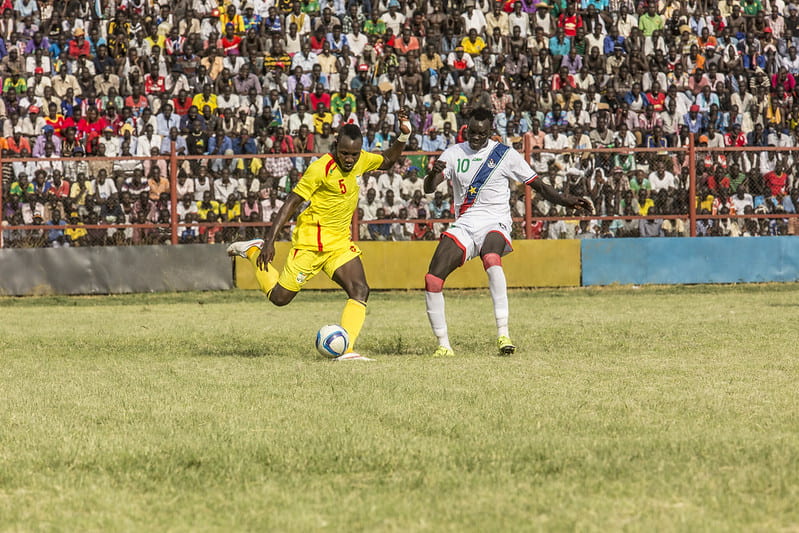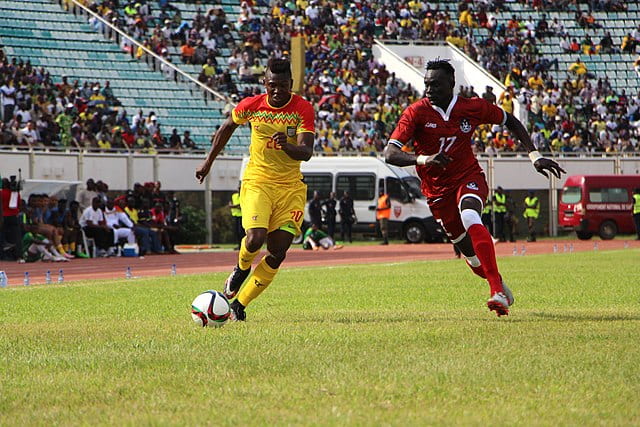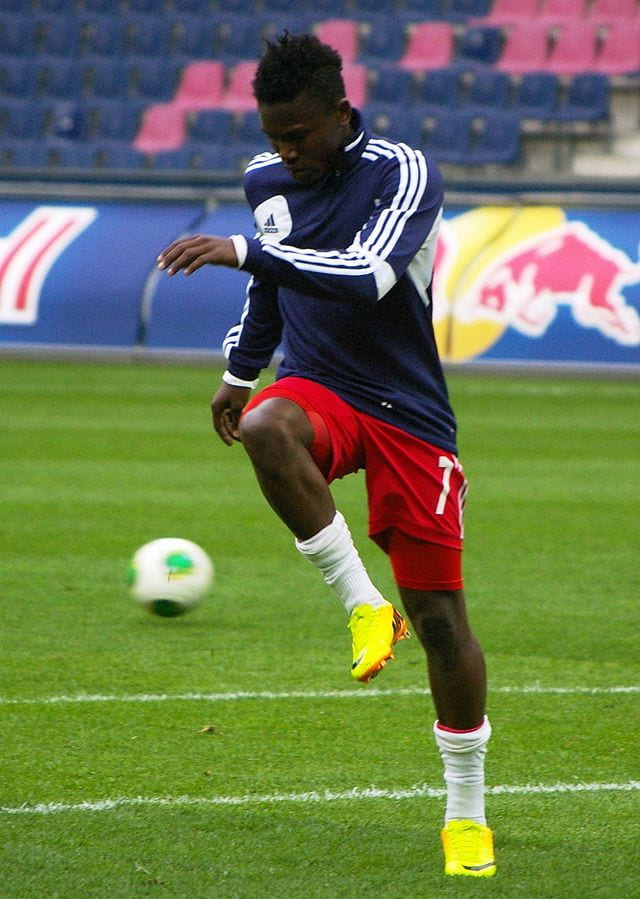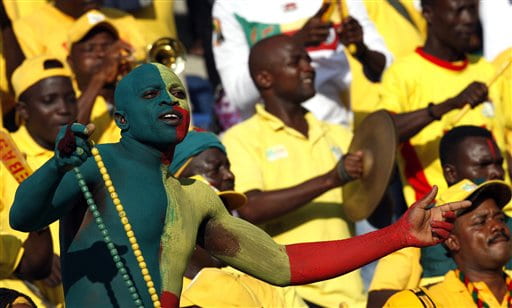By Carmel Dansou
Soccer is a popular sport in the Republic of Benin. If you randomly sample youths in the country, at least two-thirds will play soccer. That’s the first sport you’ll be introduced to if you are growing up in Benin. People like watching local as well as international soccer games. It’s not surprising to see a gathering with fierce debate about soccer. However, I should caution you, if you go to Benin now, talk about soccer but don’t mention “les écureuils” (the squirrels) because in the heart of the locals, the little rodent has fallen from grace. For almost sixty years now, the national soccer team of Benin has carried the nickname “les écureuils du Benin”. Nowadays, it is believed the name has brought nothing but failure and bad luck to the team. No one wants to hear about squirrels anymore; it’s better you talk about cheetahs.
The history of soccer in Benin is intertwined with the country’s broader sports and cultural development. Soccer, known as “football,” across the country, plays a significant role in the lives of the local population. Soccer was introduced to Dahomey (Benin was called Dahomey until 1975, when it was renamed the People’s Republic of Benin, which was officially changed to Republic of Benin in 1990) during the colonial period, particularly by European missionaries, traders, and French colonial officials. The sport quickly gained popularity among the local population due to its accessibility and the simple requirements for playing. All you need is a ball and an open space. During the colonial area, it has served mainly as leisure and recreation for locals and colonial officials.
Dahomey gained independence from France in 1960, and like the countries of French-speaking in West Africa, in the aftermath of independence, Dahomey took to sports as a tool for asserting sovereignty by adopting, during this period, a sports policy marked by the race for international titles. The country established its own soccer association, the Dahomey Football Federation. It later became Benin Football Federation (BFF) when the country’s name changed in 1975. The federation became responsible for organizing and promoting the sport within the country. Domestic leagues and competitions were established, allowing local players to showcase their talents.
As a remarkable achievement during that period, one would remember the bronze medal won by the Dahomey national football team in 1961 in Ivory Coast during “Les jeux de l’amitié” (the Friendship Games which later became all-Africa Games or the Pan African Games), a sporting event organized by France and its ex-colonies in Africa from 1960 to 1963. Also, one would remember the formidable Dahomey soccer team, which tied (2-2) with Tunisia in Porto-Novo (the political capital of Benin) and (1-1) in Tunis as part of the 1964 World Cup qualifiers. The two teams would play a third game in Casablanca, Morocco. Dahomey drew again for the third time with Tunisia. However, it was eliminated by a draw lot that would later be described as “rigged.” During those years, one of the prominent figures of the Dahomey national team was their keeper, Charles Ana. Originally from Ghana, he migrated to Benin at an early age. Very talented, he became a goalkeeper for the national team from 1960 to 1965. Until today, He is considered the best keeper our national team ever had.
During those days, it was decided that the National team of Benin needed a name. And like in many African cultures, giving a name was not to take lightly. After a long time of brainstorming and concertation, the then president of the BFF, Norbert Imbs, proposed “les écureuils du Benin” (the squirrels of Benin). Squirrels were believed to be one of the most intelligent and fastest rodents. Squirrels can reach the top of a tree quicker than any other animal; they are also very agile. The popular belief back then was that the name would set the national team on a bright destiny in soccer. With squirrels as the name, the national soccer team should write the world soccer story, so was the general belief.
The Squirrels of Benin would debut on the international soccer stage by participating in regional and continental competitions. They competed in many African Cup of Nations (AFCON) qualifiers and other regional tournaments but did not achieve any great things. They lost most of the time! They never climbed to the top of the tree as a squirrel does. In 1972, during the so-called “période révolutionnaire” (revolutionary period) with a wave of economic hardship sweeping through the country, people expected to find some solace in the national soccer team games, but the squirrels lost most of their games and people became very disappointed and unhappy at their performances. My father told me, “Those days were hard for everybody and when we gathered to watch the squirrels play and, as usual, they lost, people would start cursing squirrels. Poor animals.” You heard people saying, he continued: “Squirrels are lazy animals; why would someone name a team the squirrels of Benin and expect to win a soccer game? The name is the problem. Squirrels are not very imposing as creatures; that is why the Squirrels of Benin are not doing any great things.”
The national support for the team dropped; people would no longer go and cheer for the players. To appease the mass discontent, the squirrels would be renamed “les etoiles rouges du Benin” (the red stars of Benin). The name was meant to lead to a new and bright dawn of soccer in Benin; after all, stars are bright and full of light. However, things got worse for the red stars of Benin. “When the name was changed, things went from bad to worse, and now you heard people say we better go back to being squirrels,” my father recalled. The Squirrels, at least, were having few draws. The red stars are constantly losing. Then again, in early 1990, the team was renamed “Les écureuils du Benin”. The Squirrels were back in the game!
After 1991, there was a big shift in people’s belief. Instead of blaming the poor animal, people understood that, when faced with various challenges, including limited funding, inadequate facilities, and the lack of proper development programs, you can name your team the lions and it would not do much. The BFF and other stakeholders worked to improve soccer infrastructure, develop youth talent and enhance the game’s overall quality. Also, many national players found their ways to European, Asian and Arabic soccer leagues. The result is that over the years, the squirrels of Benin would significantly improve their games. The local league was also improved, and the country produced several talented soccer players who have gone on to play for domestic and international clubs. These players have contributed to Benin’s soccer reputation and have become role models for aspiring young players.
Among a few notable players from Benin is Stéphane Sessègnon. Sessègnon is arguably one of Benin’s most famous soccer players. He has succeeded in European leagues, including playing for Paris Saint-Germain, Sunderland, West Bromwich Albion, and Montpellier. He is known for his skill, versatility, and playmaking ability in midfield. Razak Omotoyossi is a prolific striker who has represented Benin in domestic and international competitions. He has played for clubs in various countries, including France, Turkey and Saudi Arabia. He has been a critical player for the national team. Other players include the forward Mickaël Poté (who played in French and Turkish leagues), the center-back Cédric Hountondji (who played for New York City Football Club and Clemont in France), the left-back David Kiki, the winger Jodel Dossou, the defender Khaled Adenon (who played for Le Mans FC and SC Bastia) and many more.
The team had some notable moments and achievements with this new generation of talents. These include participating in AFCON tournaments, such as their first appearance in 2004 and their quarterfinal run in 2019. During the 2019 AFCON held in Egypt, the Squirrels reached the tournament’s quarterfinals for the first time. Senegal eventually sent them out after a penalty shootout, but their journey to the quarterfinals was historic. These accomplishments brought attention to Benin’s soccer capabilities and showcased the talent within the country. Another notable victory of the Squirrels is their win against Morocco 4-1 in a 2010 FIFA World Cup qualifying match. I remember back then; people were jubilating; one would have believed they’ve won the world cup. “Allez les ecureuils” (Go squirrels) was a national song written for the team during their first participation in the AFCON in 2004.
Notwithstanding these little successes, people’s discontent with the name squirrels rose again in crescendo in recent years. I heard many say that it does not intimidate the opponents; squirrels are not achieving anything, the name is a curse, the name defines the players…this is the typical song you hear whenever they lose a game. In 2008, it was proposed to rename the team the Pythons (the python is considered a sacred animal in most part of Benin), but no consensus was reached. Squirrels stuck until last year; it was decided to say farewell and rebaptize the team asthe cheetahs of Beninin February 2022. “No more lazy squirrels, no more fearful squirrels. Benin national soccer team is now named cheetah, a very classy animal endowed with speed and power. Their future opponents will be intimidated. The song “allez les écureuils” is now sung “allez les guépards” (Go cheetahs).
As of 2023, the squirrels of Benin are ranked 93rd in the world, have never qualified for the World Cup, and have featured at the AFCON finals four times; in 2004, 2008, 2010, and 2019. In the ongoing AFCON qualifiers, they have lost or tied the games they played so far. Their fate in the incoming tournament is uncertain. The general belief is that the cheetahs of Benin will do cheetah things in the world soccer concert and might reverse the trend in the qualifiers and upcoming international soccer tournament. Time will tell us. In the meantime, don’t mention squirrels when you happen to go to Benin and decide to talk about soccer. The Squirrels era is over, and no one wants to hear about it. Benin’s soccer is in Cheetah era now!
Carmel Dansou is a graduate student in physics at UARK. He is a lover of soccer. He enjoys watching as much as playing soccer. Carmel’s favorite team is Nigeria. His two favorite players of all time are Franck Henry Pierre Ribéry, a former French professional winger and Augustine Jay Jay Okocha, a former Nigerian professional midfielder.






